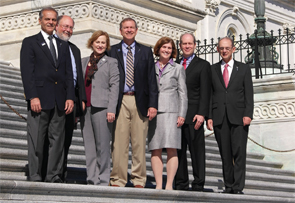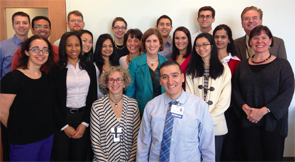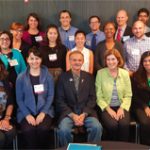
The ACR Executive Committee on Capitol Hill in October 2015.
I am honored, humbled and excited to serve as your ACR president. I’d like to share the following background information to illustrate the diverse set of life experiences I draw from to represent the ACR membership effectively.
Personal Background
Thanks to my mom, who was born and raised in Guatemala, I am bilingual in Spanish and English. I still have more than 50 cousins living in Guatemala. My dad was a Volga German raised in Kansas. I am married to a wonderful man, Blake. We have a blended family of four adult children and three grandchildren, with another one on the way.
As to my career as a physician, I spent two years working at a migrant health clinic in rural Florida and then two more years as an HMO doc and occupational health doc. For most of my career, I have been in academic medicine, which I enjoy immensely. I have had the experience of doing basic science bench research in my early career and have led numerous clinical studies, both investigator initiated and pharma funded. I have always had a busy clinical practice and, most fun for me, I have trained 88 rheumatology fellows, mentored many faculty and taught innumerable residents and medical students.
Witness to Change
Over the past three decades during which I have been a rheumatologist, our entire specialty has changed. For the most part, I believe these changes have improved the quality of life for our patients, rheumatologists and the greater rheumatology community. But we still have continued challenges, among them, insurance companies practicing medicine, governmental changes, funding issues and the workforce shortage.
The ACR has responded to the changing environmental demands of our profession and will continue to do so. Great headway has been made in a number of areas, quality and advocacy among them.

Dr. Von Feldt with fellows and faculty mentees at the University of Pennsylvania.
Where the ACR Is Headed
An ACR resource that continues to expand and attract interest is the RISE Registry. The dream of preceding ACR leadership, the ACR RISE Registry now has successfully connected 45 practices submitting data; 75 practices with signed contracts; 215 providers; 1,273,137 encounters; and 413,605 RA encounters. This seamless (once established) data entry directly from the electronic health record will allow the ACR to provide meaningful (both geographically and practice type) data for benchmarking, quality metrics and, importantly, decrease the administrative burden of overworked clinicians.



